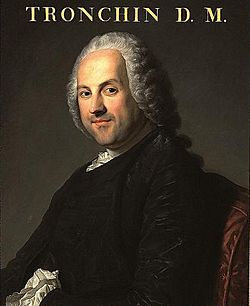Théodore Tronchin facts for kids
Quick facts for kids
Théodore Tronchin
|
|
|---|---|

Portrait of Doctor Théodore Tronchin (1709–1781), in Geneva by René Gaillard in 1785, from a work by Jean-Étienne Liotard
|
|
| Born | 24 May 1703 |
| Died | 30 November 1781 |
| Nationality | Genevan |
| Alma mater | University of Cambridge |
| Scientific career | |
| Fields | Medicine |
Théodore Tronchin (born May 24, 1709 – died November 30, 1781) was a famous doctor from Geneva, a city that was then an independent republic. He was known for his new ideas about health and medicine in the 1700s.
Contents
A Doctor's Journey
Théodore Tronchin was born in Geneva. He started his studies at the University of Cambridge in England. Later, he moved to the University of Leiden in the Netherlands. There, he learned from a very famous doctor named Herman Boerhaave.
In 1730, Tronchin earned his medical degree. He then began working as a doctor in Amsterdam, a big city in the Netherlands.
Returning Home and Moving to Paris
In the early 1750s, Tronchin went back to Geneva. He was given the special title of Professor Emeritus of Medicine. This means he was honored for his teaching and medical knowledge.
Later, in 1766, he moved to Paris, France. He opened a medical practice there, which became very popular.
Famous Patients and Recognition
Tronchin became a very influential doctor in the 18th century. Many important people, including royalty and wealthy families across Europe, wanted him as their doctor.
Some of his famous patients included the writers Voltaire, Jean-Jacques Rousseau, and Denis Diderot. His work was recognized by important groups. In 1762, he became a member of the Royal Society in London. In 1779, he was also made a foreign member of the Royal Swedish Academy of Sciences.
Tronchin's Health Ideas
Théodore Tronchin had some modern ideas about health for his time. He believed in preventing sickness and promoting a healthy lifestyle.
Believing in Inoculation
One of his most important beliefs was in inoculation for smallpox. Smallpox was a very dangerous disease that caused many deaths. Inoculation was an early way to protect people from it. It involved giving someone a small amount of the disease to make them immune.
Tronchin helped thousands of people get inoculated in Switzerland, France, and the Netherlands. This helped save many lives.
Simple and Natural Health
Tronchin was not a fan of some old medical practices. For example, he didn't like bloodletting (taking blood from a patient) or purging (making a patient vomit). These were common treatments back then.
Instead, he believed in a simple and natural approach to hygiene and health. He thought that fresh air, a good diet, and regular exercise were very important. He also thought that sitting around too much and sleeping too much were bad for health. He spent several hours each week giving free medical help to people who were poor.
His Written Works
Théodore Tronchin didn't write many books, but his few works were important.
He published a book called "De colica pictonum". In this book, he explained that a painful condition called Poitou colic was caused by lead poisoning. This was an important discovery.
He also helped write part of an article about "Innoculation" for Diderot's famous Encyclopédie. This was a huge collection of knowledge published between 1751 and 1772.
 | Precious Adams |
 | Lauren Anderson |
 | Janet Collins |

